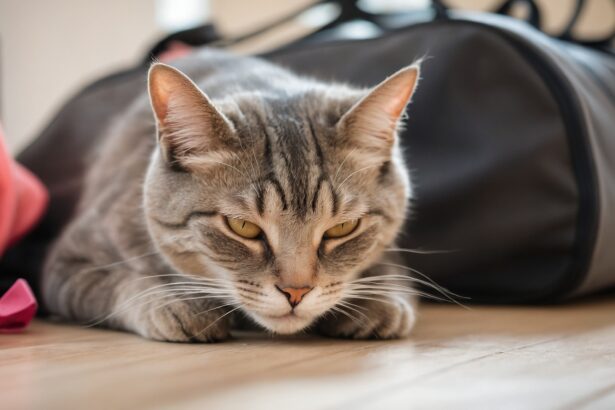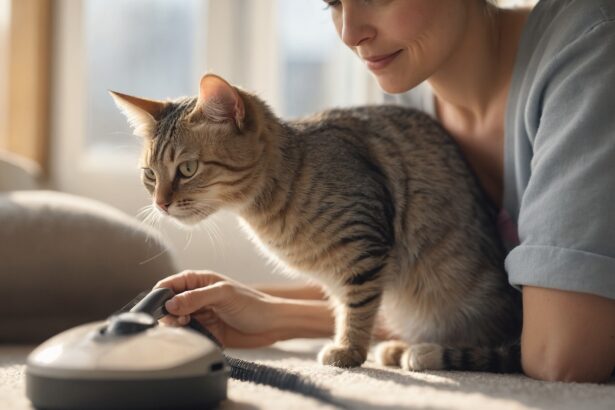Between two naps and that queenly stare, your cat suddenly lets out a loud, low meow. Love note or discreet SOS? Here’s how to decode that deep voice without spiraling. For a full tour of feline sounds, explore this complete guide to cat meows.
Why a loud, low meow grabs your attention
That deeper tone stands out because it’s not their everyday “mew.” It can signal strong emotion (fear, anger) or an urgent need (pain, help, feeling alone). Your superpower? Read the full scene.
- Body language: tense stance, tail whipping, ears back, dilated pupils
- Context: time of day, recent changes, vet visit, a closed door
- Daily habits: appetite, litter box routine, sleep pattern shifts
Pain: red flags you shouldn’t miss
A cat meowing loud and low may be hurting (teeth, joints, belly, or urinary blockage in male cats). Watch for limping, flinching when touched, sudden litter accidents, hiding, or skipping meals.
Practical move: record 20–30 seconds of the meow and jot down the time, what was happening, and how long it lasted. Your vet will love the clarity. For other health clues to monitor, see how to spot common cat diseases.
Fear and stress: when the world feels scary
New noises, a move, strange smells, a visiting pet… that deep meow can turn into “stay close, I’m scared.” Offer a calm hideaway up high with a cozy blanket that smells like home.
Skip the scolding. It only raises the volume and the stress. Instead, slow-blink, speak softly, and guide her to her safe spot. Need a checklist? Here are the key signs of stress in cats and how to help.
Anger, frustration, or simply fed up
A blocked doorway, less-than-pristine litter, or a bold neighborhood cat can spark a low “enough!” Tail swinging like a metronome? You’re in the irritation zone.
To avoid mixed signals, brush up on tail talk with this tail-language guide. Then tweak the setup: fresh litter, multiple retreat spots, and sturdy scratchers.
Communication: “Listen to me, human!”
Sometimes that deep voice just means “I need you”—food, fresh water, playtime, or a routine that’s gone off track. Older cats or naturally talkative ones may use a lower register more often.
Fun fact: adult cats rarely meow to each other; meows are mostly for us. With other cats, they lean on posture, scent, and subtle sounds. If the calls peak after dark, peek at why cats meow at night and how to respond.
Common mistake to avoid
Feeding or treating after every meow. It teaches “meow = buffet,” and the volume climbs day by day. Why it backfires: behaviors that get rewarded get repeated. Set steady schedules and wait for a short pause before you serve.
When should you worry?
- Sudden deep meows plus lethargy, vomiting, or straining to urinate
- Visible pain (stiff walk, crying when touched, hiding for hours)
- Loss of appetite, excessive thirst, or noticeable weight loss
- Senior cat with new nighttime vocalizing and confusion or pacing
In these cases, call your vet promptly. A reassuring exam beats waiting on a brewing problem.

How to calm a cat that meows loud and low
- Golden routine: keep meal, play, and bedtime consistent so she knows what’s next.
- Burn energy kindly: 2–3 play sessions (wand toys, feather teasers) to drain the “zoomies.”
- Enrich the day: puzzle feeders, sniff mats, varied scratchers, and window perches.
- Zen corner: a “snuggle box” with your clean T-shirt, a blanket, and a favorite toy.
- Pheromones: a diffuser in the main room during changes (moves, guests).
- Respond without reinforcing: wait for a brief quiet moment before feeding or opening a door.
- Fresh basics: clean litter and crisp water calm many protests before they start.
Original how-to: train a “quiet” cue. When your cat pauses mid-meow, mark it with a gentle “yes” (or a click), then reward. Gradually stretch the silent seconds and add a hand signal. Short, sweet sessions work best.
Need more help decoding vocal moods and body talk? You’ll love our ultimate meow guide with examples you can practice at home.
Bonus tip
Build a mini “meow dictionary.” Record 3–4 types (deep, high, trilled, raspy) and note the context. In a few weeks, you’ll know what she wants from the first note.
FAQ
Why is my cat meowing loud and low all of a sudden?
Strong emotion (fear, frustration) or acute pain are common triggers. Check posture, appetite, water intake, and the litter box. If anything feels off, call your vet.
Is a hoarse or raspy meow in cats serious?
It can follow vocal strain or mild irritation, but if it lasts beyond 24–48 hours—especially with fatigue, coughing, or appetite loss—book a vet visit.
How do I stop my cat meowing at night?
Play then feed in the evening, keep a predictable routine, and ignore off-schedule calls. If night meowing is new or intense, rule out pain or illness first.
Why do senior cats meow loudly?
Age-related discomfort, sensory changes, or disorientation can increase vocalizing. Schedule a health check, keep litter and water easy to reach, and add a soft night light.









